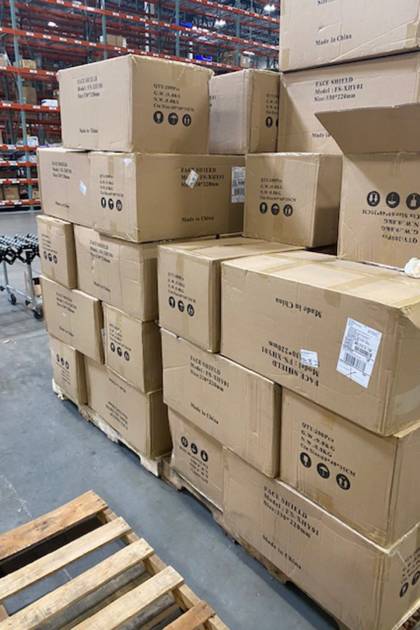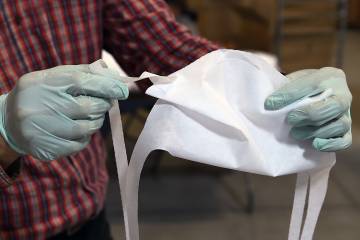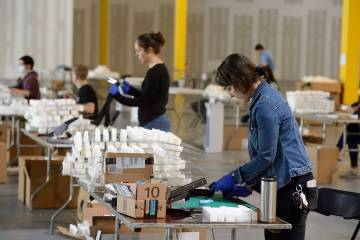Honggang Cui watched with concern from afar earlier this year as his hometown in China's Henan province locked down to prevent more cases of the novel coronavirus, which was quickly spreading from the city of Wuhan in neighboring Hubei province.

Image caption: The shipment of personal protective equipment to the Johns Hopkins Health System ballooned from 1,000 to 10,000 face shields and masks, thanks to the efforts of an international group of Hopkins faculty, students, and parents
Cui, an associate professor of chemical and biomolecular engineering at the Johns Hopkins Whiting School of Engineering, knew from media coverage that medical supplies, including the personal protective equipment, or PPE, used by frontline health care workers, had become scarce during the height of the pandemic there. So when COVID-19 began to spread in the United States in late February, he wanted to do something to help.
"My hometown was hit very hard and was on lockdown," said Cui, who is also a member of the Johns Hopkins Institute for NanoBioTechnology. "I knew how bad it would be, so I wanted to try to find supplies of PPE in China and have them sent to our health care workers here at the Johns Hopkins Health System."
Cui began asking friends and family back in China to help him with this project but quickly learned that other members of the Johns Hopkins community—including fellow professor and INBT Associate Director Hai-Quan Mao, students of Chinese heritage, and their parents—had the same idea. Connecting as strangers online, they joined forces, leveraged their resources, and succeeded in coordinating the delivery of 10,000 face shields and N95 masks from various cities and towns in China to the Johns Hopkins Health System in mid-April.
Diana Yin, whose son William Li is a third-year computer science major at Hopkins, was among those who spearheaded the effort. Yin, who lives in Orlando, Florida, said she was inspired to give back after friends, acquaintances, and strangers from all over the world came together to support her while her eldest son, away at grad school on the West Coast, was seriously ill with what the family now thinks may have been COVID-19. After she mentioned in a JHU parent WeChat group her plans to buy and send 1,000 face shields from China to the U.S., Cui and others expressed their willingness to contribute to a larger order. In the end, contributions from more than 40 people, including JHU faculty and parents, helped that order grow to 10,000.
"I was overwhelmed by all the help we received," Yin said. "In just 24 hours, we got all of this done, and friends of mine in China helped us negotiate fair prices for the face shields, so we could order as many as possible."
Collecting contributions and buying the PPE in China was easy compared to getting the shields and masks out of that country while international flights were curtailed and limits were placed on how many N95 masks and other PPE could be exported. Yin, Cui, and others in the group called on their personal and professional networks to surmount those challenges by arranging for friends and acquaintances to receive the items from China in bits and pieces. For example, one biomedical engineering professor involved in the effort helped coordinate deliveries to 15 separate contacts in Delaware, Maryland, and Virginia, who in turn shipped them to Johns Hopkins departments. From there, department staff members helped faculty arrange delivery to the Johns Hopkins Health System.
"It's reassuring to staff," said Robin Ingram, assistant vice president of alumni relations for the Johns Hopkins School of Medicine. "The donations have helped us to be well stocked."
These efforts by members of the Whiting community are among several such projects taking place across Johns Hopkins. For example, Linzhao Cheng, a professor in the School of Medicine, worked with his professional and social networks in China to arrange for more than 65,000 masks to be sent to the Johns Hopkins Health System, Greater Baltimore Medical Center, and others. Xin Chen, an associate professor of biology at the Krieger School of Arts and Sciences, helped coordinate the donation of 10,000 surgical masks, 800 N95 masks, and 800 protective outfits and shoe covers.
Thousands more masks and hundreds of pieces of PPE continue to trickle in from China because of the efforts of faculty across the university. Those involved said they were motivated to help health care workers facing the challenges of caring for patients during this global pandemic.
"No matter if you are Chinese or American, this virus is spreading around the world and we, as humans, have a fundamental motivation to help others," Yin said.
Posted in University News, Student Life
Tagged coronavirus, covid-19










